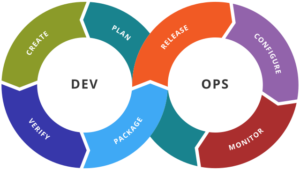In the dynamic world of information technology, the demand for speed, efficiency, and reliability has never been higher. As businesses across the globe strive to stay ahead of the curve, the DevOps movement has emerged as a transformative force, redefining the paradigms of software development and IT operations. Within the consulting sphere, this shift has led to a significant evolution of practices and methodologies. This blog post delves into the rise of DevOps in IT consulting, exploring its impact, the challenges it addresses, and the benefits it brings to both consultants and their clients.
The Genesis of DevOps:
To appreciate the ascent of DevOps in IT consulting, it is crucial to understand its origins. DevOps is a portmanteau of “Development” and “Operations,” and it represents a cultural and professional movement that promotes collaboration between these traditionally siloed teams. The goal is to create a more agile, responsive, and resilient IT service delivery model. This movement gained momentum in the late 2000s as organizations sought to overcome the inefficiencies of the waterfall development model and the disconnect between software developers and IT operations staff.
The Intersection with IT Consulting:
IT consulting firms have traditionally been the navigators of technological change, guiding businesses through the complexities of adopting new systems and processes. As DevOps principles began to prove their value in accelerating development cycles and enhancing operational stability, consulting firms quickly recognized the need to integrate these practices into their service offerings. The rise of DevOps in IT consulting is a response to the market’s demand for expertise in fostering environments where continuous integration, continuous delivery (CI/CD), automated testing, and proactive monitoring are the norm.
The DevOps Impact on Consulting Services:
The integration of DevOps into IT consulting has reshaped the landscape of consulting services. Consultants are now expected to possess a deep understanding of both the cultural shift and the technical practices that underpin DevOps. This dual expertise enables them to assist clients in implementing DevOps methodologies, automating pipelines, and fostering a culture of collaboration and continuous improvement.
- Strategic Advisory:
Consultants provide strategic guidance to organizations looking to adopt or enhance their DevOps practices. They help clients understand the implications of DevOps on their business processes, team structures, and technology stacks. This often involves conducting maturity assessments, defining roadmaps, and identifying key performance indicators (KPIs) to measure success.
- Technical Implementation:
DevOps consulting goes beyond advice to hands-on implementation of tools and processes. This includes setting up version control systems, automating builds and deployments, configuring monitoring solutions, and establishing feedback loops. Consultants work closely with client teams to ensure that the technical foundation for DevOps is solid and scalable.
- Cultural Transformation:
One of the most challenging aspects of adopting DevOps is the cultural change required. Consultants play a pivotal role in facilitating this transformation by promoting collaboration, advocating for shared responsibilities, and helping to break down silos. They provide training, workshops, and coaching to instill a DevOps mindset across the organization.
- Continuous Improvement:
DevOps is not a one-time project but a continuous journey. Consultants assist clients in establishing practices for ongoing optimization, such as regular retrospectives, performance tuning, and the exploration of emerging technologies. This ensures that DevOps practices evolve in line with business objectives and industry advancements.
Challenges and Considerations:
The rise of DevOps in IT consulting is not without its challenges. Consultants must navigate complex organizational structures, resistance to change, and a diverse landscape of tools and technologies. They must also stay abreast of the latest trends and best practices in a field that is constantly evolving.
Moreover, there is no one-size-fits-all approach to DevOps. Consultants must tailor their strategies to the unique needs and maturity levels of each client. This requires a blend of technical acumen, interpersonal skills, and strategic thinking.
The DevOps Benefits Unleashed:
The benefits of embracing DevOps in IT consulting are manifold. For clients, DevOps can lead to faster time-to-market, improved service quality, and enhanced operational efficiency. For consulting firms, it represents an opportunity to deepen client relationships, expand service offerings, and differentiate themselves in a competitive market.
Conclusion:
The rise of DevOps in IT consulting marks a significant milestone in the evolution of the industry. As organizations continue to seek ways to innovate and compete in the digital age, the demand for DevOps expertise will only grow. IT consulting firms that can effectively integrate DevOps principles into their practices will be well-positioned to lead their clients through the transformative journey ahead. In this ever-changing landscape, the fusion of development and operations is not just a trend—it is the blueprint for the future of IT service delivery.

